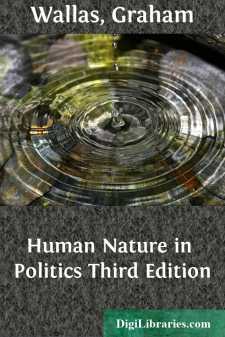Categories
- Antiques & Collectibles 13
- Architecture 36
- Art 48
- Bibles 22
- Biography & Autobiography 813
- Body, Mind & Spirit 142
- Business & Economics 28
- Children's Books 15
- Children's Fiction 12
- Computers 4
- Cooking 94
- Crafts & Hobbies 4
- Drama 346
- Education 46
- Family & Relationships 57
- Fiction 11829
- Games 19
- Gardening 17
- Health & Fitness 34
- History 1377
- House & Home 1
- Humor 147
- Juvenile Fiction 1873
- Juvenile Nonfiction 202
- Language Arts & Disciplines 88
- Law 16
- Literary Collections 686
- Literary Criticism 179
- Mathematics 13
- Medical 41
- Music 40
- Nature 179
- Non-Classifiable 1768
- Performing Arts 7
- Periodicals 1453
- Philosophy 64
- Photography 2
- Poetry 896
- Political Science 203
- Psychology 42
- Reference 154
- Religion 513
- Science 126
- Self-Help 84
- Social Science 81
- Sports & Recreation 34
- Study Aids 3
- Technology & Engineering 59
- Transportation 23
- Travel 463
- True Crime 29
Graham Wallas
Graham Wallas (1858–1932) was an English social psychologist, educator, and writer, known for his pioneering work in political science and the psychology of social behavior. He was a founding member of the Fabian Society, a socialist organization aimed at promoting social reform, and he contributed extensively to discussions on democracy and social structures. His notable works, including "The Art of Thought" and "Human Nature in Politics," explored the processes behind decision-making, creativity, and the influence of human nature on political systems. Wallas’s ideas laid foundational concepts in both political theory and social psychology, influencing thinkers and reformers throughout the 20th century.
Author's Books:
Sort by:
by:
Graham Wallas
CHAPTER I Whoever sets himself to base his political thinking on a re-examination of the working of human nature, must begin by trying to overcome his own tendency to exaggerate the intellectuality of mankind. We are apt to assume that every human action is the result of an intellectual process, by which a man first thinks of some end which he desires, and then calculates the means by which that end...
more...


